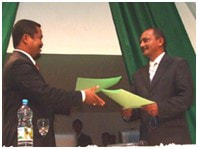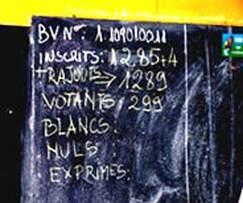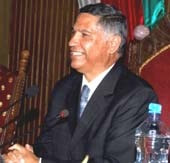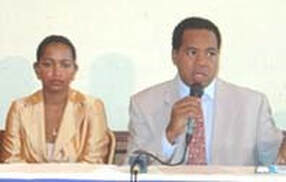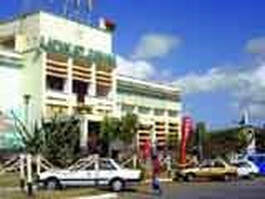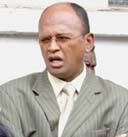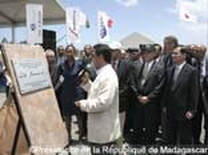Anglo-Malagasy Society Newsletter 58: December 2007 |
| ||
Society news
Dr Jakob Adolf gave the Society a fascinating insight into the work of the Mission Aviation Fellowship at a meeting on 10th October 2007. MAF provides air transport to remote parts of Madagascar and thereby an important link to isolated communities for their inhabitants, NGOs and vital services. In a talk memorable for its fluency, enthusiasm and striking photos, Jakob described the challenges of building air strips, of deciding on priorities and of raising finance. For those wishing to know more or to support MAF there is a profile with contact details in the last part of this newsletter.
The next Society meeting will be on Wednesday 9th January 2008 at 6 for 6.30pm when Ewan Laurie will present 'Into the Eighth Continent: the BSES Expedition to Madagascar 2007' about the experiences of the British Schools Exploring Society party on their visit to the island in July of this year.
The venue will again be the Ognisko Polish Club at 55 Exhibition Road, London SW7, which is just north of the Victoria & Albert Museum in South Kensington, and where we will be able once again to serve Malagasy food. Non-members wishing to attend can contact the Secretary Stuart Edgill.
Members of the Society may already know of the sad news of the death in November of Lord Merrivale, who was the founder of the Society and its Chairman for the first twenty-five years; an obituary is below.
The next Society meeting will be on Wednesday 9th January 2008 at 6 for 6.30pm when Ewan Laurie will present 'Into the Eighth Continent: the BSES Expedition to Madagascar 2007' about the experiences of the British Schools Exploring Society party on their visit to the island in July of this year.
The venue will again be the Ognisko Polish Club at 55 Exhibition Road, London SW7, which is just north of the Victoria & Albert Museum in South Kensington, and where we will be able once again to serve Malagasy food. Non-members wishing to attend can contact the Secretary Stuart Edgill.
Members of the Society may already know of the sad news of the death in November of Lord Merrivale, who was the founder of the Society and its Chairman for the first twenty-five years; an obituary is below.
Bilateral relations
The Malagasy Minister of the Economy, Mr Ivohasina Razafimahefa, paid a brief visit to London from 12th to 14th November. His main purpose was to attend a Madagascar Development Forum organised by the Foreign Policy Centre (an independent think-tank set up by Tony Blair) at the House of Commons on 13th November. The Minister showed an impressive command of English in making his ‘keynote speech’ without notes and in answering a wide range of questions from the audience, which included representatives of NGOs and business as well as journalists, African diplomats and a number of parliamentarians. A main focus of the discussion was the Madagascar Action Plan, described as “a comprehensive strategy for reducing poverty”. The Minister also had a meeting with Lord Malloch-Brown, the Minister for Africa in the FCO.
Politics in Madagascar
Assembly elections
In the legislative elections held on 23rd September President Ravalomanana’s TIM party won 106 of the 127 seats contested. While short of his ambitious target of winning all the seats available, it was still a comprehensive success. TIM was as usual better organised and better financed, with each of their candidates receiving 10m Ariary (about £3,000), three times more than in 2003 when TIM had perhaps more natural support. As in other recent contests the opposition struggled to be effective or to form a united front, although one alliance included Maurice Beranto’s USDM, Jean Lahiniriko’s PSDUM and Herizo Razafimahaleo’s Leader party. The Arema party was itself divided: the wing led by former president Didier Ratsiraka boycotted the event, but some members stood as independents and the wing led previously by Pierrot Rajaonarivelo and now by Pierre Houlder Ramaholimasy presented 37 candidates. In the end only two of the many opposition parties won seats: Leader-Fanilo and the Liarike of Kaleta, aka Jean Andre Soja, who resigned his own seat in the Senate to sit as a deputy.
|
The reformist wing of TIM, known variously as CRTIM and CRTiM (for the Cercle de réflexion sur Tanindrazantsika i Madagasikara) and led by Jean Clément, vice-President of the Senate, and Jean Ranjivason, did not win a single seat. However, the reformers did manage to force some change, when Solofonantenaina Razoarimihaja resigned after five years as president of the party for ‘health reasons’ that appeared to relate more to the party than to him. He was replaced by Yvan Randriasandratriniony, who had been returned as deputy for Fianarantsoa I but with only a relatively disappointing 38% of the vote.
|
|
The turnout appeared low, although the final figures from the Conseil National Electoral came to 46.2% of the 7.5m registered voters; it was as low as 20% in parts of Tana. A COMESA mission declared the elections to be peaceful, safe and sufficiently transparent, though it only had five observers, as had the one from the African Union which also commented favourably on the organisation of voting. Others, such as KMF/CNOE, complained of anomalies and irregularities, and called for further electoral reform while appealing to the international community by sending a dossier to embassies and representative offices. There were suggestions of pressure on leaders of the fokontany, although the CNE, in dismissing those of the 35 official complaints relating to this, declared that they and the heads of region were not fonctionnaires d’autorité and were therefore entitled to campaign.
|
New government
President Ravalomanana retained Charles Rabemananjara and kept most of his team in place. Mme Bakolalao Ramanandraibe became Minister of Justice, replacing Mme Lala Ratsiharovala; Elysé Razaka returned to the Ministry of Energy and Mines, replacing Koto Bernard ; and Mme Cécile Manorohanta, who was previously vice-minister of Education, took over from General Behajaina Petera at Defence, becoming the first woman and civilian to head the armed forces. Benjamin Radavidson moved from Finance to Education; Harrison Randriarimanana has gone from Commerce to the Environment; and Patrick Ramiaramanana is the new Minister of Culture and Leisure.
TIM dominates the political structure, holding all seven places on the National Assembly’s permanent bureau, which now includes only three vice-presidents (Emile Rakotomalala, Zafilaza and André Tsitohery Avison) rather than six previously. In October there was a change to the protocol of the government with the prime minister now ranking second, ahead of the president of the Senate who according to the constitution would normally assume responsibility in the absence of the President; the senators were again unhappy.
TIM dominates the political structure, holding all seven places on the National Assembly’s permanent bureau, which now includes only three vice-presidents (Emile Rakotomalala, Zafilaza and André Tsitohery Avison) rather than six previously. In October there was a change to the protocol of the government with the prime minister now ranking second, ahead of the president of the Senate who according to the constitution would normally assume responsibility in the absence of the President; the senators were again unhappy.
Court appearances
|
Roland Ratsiraka was given a suspended 18-month prison sentence on one of the four charges against him and was cleared of the other three. He was released from jail and complained of being a victim of harassment, but he has since kept a low profile and been apparently busy with his lychee business. In the other high profile case involving opponents of the regime the former mayor of Fianarantsoa, Pety Rakotoniaina, received a five-year prison sentence for the misappropriation of public vehicles.
|
New elections
Campaigning is currently under way for municipal and communal elections to be held on 12th December. This time the vote will take place on a single day, not two; and mayors in rural areas will be chosen after a single round of direct voting rather than from a list of councillors. Eight of the opposition parties have decided on a boycott including Herizo Razafimahaleo’s Leader, Pierre Houlder Ramaholimasy’s wing of Arema, Evariste Marson’s RPSD, the PSDM of Jean Lahiniriko and Maurice Beranto’s Fidem; in 2003 a hundred mayors were elected for Leader, and forty for the RPSD. However, Roland Ratsiraka’s Malagasy Tonga Saina will take part.
Death penalty
The new Minister of Justice said in mid-November that she personally supported the death penalty, after twelve people were sentenced to death for murder and rebellion. The case related to events in August 2006 when villagers in Analavory west of the capital, who were opposed to the sale of land to a businessman for tourist development, resisted a police force and killed two of them. There have been no public executions in Madagascar since independence in 1960.
Economic and social matters
Electricity
|
The problems of Madagascar’s electricity supply continue, with power cuts of two hours a day in parts of the capital in November as demand increased. In 2008 there will be difficulties when the country’s largest hydro-electric plant will undergo major maintenance work and be out of action for a total of seven weeks in three stages; the Andekaleka plant provides 30% of Antananarivo’s electicity, although the new Mandroseza plant is meant to help. A new 7.5 Megawatt thermal plant was opened in Antsiranana in October, doubling the city’s capacity and perhaps ending the extensive power cuts there of recent months, although not immediately. In Toamasina a new plant of 12.7 Mw has also opened. The SADC committed to help sort out JIRAMA, with engineers due out in October. However, customers have had to pay 15% more for their electricity since October, in a move announced by the President himself who talked of the need to be tough on collecting income. The President also re-iterated his opposition to the possible privatisation of Jirama, citing issues of economic independence.
|
Loi de Finances and taxes
|
The new Minister of Finance, Hajanirina Razafinjatovo, presented a 2008 budget which had targets of a budget deficit at 3% of GDP and economic growth of 7.3%. VAT will be increased from 18% to 20%, with the extra take due to go to the regions; VAT refunds should also be extended beyond exporters. The number of taxes has halved from 28 to 14; those removed include the 5% transaction tax, the tourist licence and the professional tax. There will be a greater focus on the important issue of revenue collection, with 150 further agents recruited. The threshold for the payment of income tax, the impôt sur les revenus salariaux et assimilés (Irsa), has been raised from 50,000 to 180,000 Ariary (£50) and the tax will be levied at a simpler uniform rate of 25%.
|
Doing business
Madagascar ranked 149th out of 178 countries in the World Bank’s report in September on ‘Doing Business 2008’, a slight difference to 2007 when it also ranked 149th but out of 175 countries. Madagascar is credited with making it easier to set up a business and with facilitating exports, but is still weak in matters of labour law and in the scope to obtain loans. The newly-created Economic Development Board reported that 800 companies had been set up in the first half of 2007 and expected a total of at least 1,000 for the full year.
Foreign investment
Canada became the largest overseas investor in Madagascar in 2006 almost entirely due to mining and largely due to the QMM (Rio Tinto) and Dynatec (Sherritt) operations. France slipped to second place, with its investment down 10% but still strong in the financial sector, while Mauritius was third with a near 20% increase, in areas such as petrol, finance and construction. The EDB has a target of $500m of foreign direct investment by 2012 and has reported possible projects of $250m.
Foreign aid
The European Union allocated €588m to Madagascar for 2008-13 under its tenth Fonds Européens de Développement (FED), announced during a visit to Brussels in October by the then Minister of Finance Andriamparany Radavidson. The Arab Bank for Economic Development in Africa has lent Madagascar $4.3m at a favourable interest rate of 1% to fund the building of the National Accounting and Business Administration Institute.
Child health
During a health campaign over a week in late October 1.4m mosquito nets were distributed to combat child mortality from malaria, in a programme led by the Malagasy government and supported inter alia by UNICEF and the Red Cross. The programme also included the inoculation against measles of 2.8m children aged from 9 months to five years, who were also given vitamin A and a de-worming medicine. A UNICEF report said that child mortality had reduced by 43% over the last decade but that there would still be 60,000 deaths a year from largely preventable diseases. The campaign also involved the encouragement of wider use of contraception.
Population
The Minister of Health, Jean Louis Robinson, warned in October that Madagascar’s population would grow to 50m by 2030 with serious implications for potential poverty. He called on women to limit their families to three children for their own sakes and that of the country; there are currently 5.4 children on average per family.
Other issues
China: Madagascar will be one of twenty African countries that will pay no tax on importing 400 separate products into China. The Chinese-built cement plant at Ambohimanambola has met with delays. A new hospital, a gift from China, is due to open in Antananarivo in 2009.
IMF visit: the International Monetary Fund gave Madagascar a favourable report after its visit from 20th September to 3rd October. Economic growth has improved from 5% in 2006 to an estimated 6.3% in 2007, inward investment has boosted the Ariary, government spending has improved and inflation has fallen to about 7.5% at the end of 2007, even with the sharp increase in fuel prices. The IMF has forecast that the rate of inflation will be a little lower again in 2008, at 7.2%, based on assumptions of a prudent budget and further reforms in areas such as tax and exports.
Cloves: there have been reports of a sharp drop in production in a number of countries, including Zanzibar, the Comoros and Madagascar, where the crop is now forecast at 3,000 tonnes compared to 12,000 tonnes a year earlier.
Roads: at a meeting of African states on road maintenance held in Antananarivo in October President Ravalomanana announced plans to build and refurbish 12,000 km of roads over the next four years. The plans have the support of various international donors, especially the EU.
Weather: the country’s meteorological service warned that Madagascar faced another tough cyclone season and that there is a high risk of flooding with rains forecast to be above the average of the last 30 years. The first heavy rain fell in mid-November and prompted concerns over the security of dykes.
Corruption: Madagascar ranked 94th out of 179 countries in Transparency International’s analysis of corruption, with a score of 3.2 out of 10 that was marginally better than the 3.1 recorded the previous year.
IMF visit: the International Monetary Fund gave Madagascar a favourable report after its visit from 20th September to 3rd October. Economic growth has improved from 5% in 2006 to an estimated 6.3% in 2007, inward investment has boosted the Ariary, government spending has improved and inflation has fallen to about 7.5% at the end of 2007, even with the sharp increase in fuel prices. The IMF has forecast that the rate of inflation will be a little lower again in 2008, at 7.2%, based on assumptions of a prudent budget and further reforms in areas such as tax and exports.
Cloves: there have been reports of a sharp drop in production in a number of countries, including Zanzibar, the Comoros and Madagascar, where the crop is now forecast at 3,000 tonnes compared to 12,000 tonnes a year earlier.
Roads: at a meeting of African states on road maintenance held in Antananarivo in October President Ravalomanana announced plans to build and refurbish 12,000 km of roads over the next four years. The plans have the support of various international donors, especially the EU.
Weather: the country’s meteorological service warned that Madagascar faced another tough cyclone season and that there is a high risk of flooding with rains forecast to be above the average of the last 30 years. The first heavy rain fell in mid-November and prompted concerns over the security of dykes.
Corruption: Madagascar ranked 94th out of 179 countries in Transparency International’s analysis of corruption, with a score of 3.2 out of 10 that was marginally better than the 3.1 recorded the previous year.
Tourism
Awards: Azafady won the award for Best Volunteering Organisation and Blue Ventures was highly commended for Best in Marine Environment in the Responsible Tourism Awards announced in November.
Other news: In September the Government clamped down on informal hotels in the capital and other cities, while also attempting to check on the payment of the tourism vignette. A new magazine, Info Tourisme Madagascar, will be published in January 2008. The head of the EDB has talked of the need for a further 24,000 hotel rooms to satisfy the country’s target of 500,000 visitors in 2012. A group of tour operators has proposed a new tax to be included in air tickets.
Other news: In September the Government clamped down on informal hotels in the capital and other cities, while also attempting to check on the payment of the tourism vignette. A new magazine, Info Tourisme Madagascar, will be published in January 2008. The head of the EDB has talked of the need for a further 24,000 hotel rooms to satisfy the country’s target of 500,000 visitors in 2012. A group of tour operators has proposed a new tax to be included in air tickets.
Minerals and fuels
Ilmenite: A report in October by Panos London, which was commissioned by Friends of the Earth and based on research in February 2007, found that an element of poor communication at the QMM/Rio Tinto ilmenite mine near Fort Dauphin had created mistrust and social tension, which was in danger of escalating.
|
Nickel: The President inaugurated the treatment plant of Sherritt’s nickel and cobalt mine at Ambotavy. The company announced that it would now invest $3.3bn in the project, almost a third more than the $2.5bn previously planned due to higher costs for equipment, fuel and wages – which have been reported at between 800 and 2,400 Ariary an hour (22p to 66p) for the 1,655 to be employed directly and 5,622 indirectly. A report in November said that 160 families had been displaced by the mining works.
|
Diamonds Fields, a company based in Cape Town, is actively exploring another nickel deposit, at Valozoro 300 km south of Antananarivo, which it suggests has a potential of 65,000 tonnes.
Biofuels: a British company, Gem BioFuels Plc, raised £3.5m in its flotation on the Alternative Investment Market in October to develop its business in Madagascar. Gem has rights over 450,000 hectares to plant jatropha, an oil-producing plant that is not used for food and that can grow on savannah and marginal land rather than on arable land. The company has planted 1,300 ha to date.
Platinum: Jubilee has reported pleasing progress at its Antsahabe prospect.
Oil: Exxon Mobil revealed plans to start deep-sea exploration in mid-2008 at one or all of its prospects off Mahajanga, Ampasindava, Cap St-André and Ambilobe. Work at each area would cost $100m.
Sapphires: there was a report by Jonny Hogg for the BBC in November on the search for sapphires in Ilakaka.
Biofuels: a British company, Gem BioFuels Plc, raised £3.5m in its flotation on the Alternative Investment Market in October to develop its business in Madagascar. Gem has rights over 450,000 hectares to plant jatropha, an oil-producing plant that is not used for food and that can grow on savannah and marginal land rather than on arable land. The company has planted 1,300 ha to date.
Platinum: Jubilee has reported pleasing progress at its Antsahabe prospect.
Oil: Exxon Mobil revealed plans to start deep-sea exploration in mid-2008 at one or all of its prospects off Mahajanga, Ampasindava, Cap St-André and Ambilobe. Work at each area would cost $100m.
Sapphires: there was a report by Jonny Hogg for the BBC in November on the search for sapphires in Ilakaka.
Wildlife and conservation
Kew atlas
The Royal Botanic Gardens, Kew and its partner organisations have produced the first vegetation atlas of Madagascar, using state-of-the art remote sensing technology and methodologies. The comprehensive study is the culmination of over twenty years of conservation work by botanical and conservation institutions in Madagascar and abroad. While warning that only 18% of the country's native vegetation remains intact and that a third of primary vegetation has disappeared since the 1970s, it provides a useful insight into which type of primary vegetation is rarest, which is currently disappearing fastest and which needs to be protected. The atlas also incorporates detailed consultations with the conservation community to ensure that the information it provides is of maximum relevance and utility to conservation planners and managers. The book’s ISBN number is 978 1 84246 198 3 and its authors are Justin Moat and Paul Smith.
Fire tracking
A new system of tracking bushfires via satellites was launched in November by Madagascar’s Ministry of the Environment, Conservation International and USAID. The system uses two of NASA’s satellites which can detect fires in as little as 50 cm² of ground, which should help to identify and control any outbreaks. The information is open to the public by subscribing for free at www.firealerts.conservation.org.
100 animals
Bradt Guides published in October a fine book called ‘100 Animals To See Before They Die’, inspired by the Zoological Society of London’s conservation project EDGE (Evolutionary Distinct and Globally Endangered). It is written by Nick Garbutt, a specialist on Madagascar’s wildlife, and includes the indri, golden bamboo lemur, giant jumping rat and narrow-striped mongoose.
Events
The exhibition at the Royal Geographical Society on 6th October hosted by the Embassy of Madagascar was a good success, well-attended, widely-appreciated and a useful source of income and ideas for the stall holders. The party Madagascar on Thames on 23rd September on board HMS President organised by Chris and Vao Brown was also very well-attended.
Obituary – Lord Merrivale
Lord Merrivale was born in 1917, the son of the second Baron Merrivale and his French wife, and his first wife was also French. After education in British schools, including Dulwich, he studied at the Ecole des Sciences Politiques in Paris. He joined the RAF in 1940 and as a Flight Lieutenant was a member of the British Military Administration in Madagascar. After the administration was handed over to a Free French government, he stayed on with the British Military Mission as liaison officer with the government, for which his perfect French well qualified him.
Lord Merrivale succeeded to his father’s title in 1951 and became an active member of the House of Lords. One of his special interest was Gibraltar. He became Chairman of several companies based in Gibraltar and was given the Honorary Freedom of the town in recognition of his defence of Gibraltar’s interests in the Lords. He also became much involved in French Africa after the French colonies became independent in 1960. He was Chairman of the British Committee for Furthering of Relations with French-speaking Africa and the GB-Senegal Friendship Association.
In 1961, together with others who had served in Madagascar during the War, he founded the Anglo-Malagasy Society and was its first Chairman. He was an active Chairman, attending nearly all meetings and visiting Madagascar several times. He also organised and presided at the much-appreciated annual dinners of the Society at the House of Lords. He retired as Chairman in 1986 but accepted the specially-created position of (honorary) President and, together with his second wife Betty, continued to attend meetings of the Society for a number of years. He died on 1st November 2007 at the age of 90. Lady Merrivale had predeceased him in 2001.
Lord Merrivale succeeded to his father’s title in 1951 and became an active member of the House of Lords. One of his special interest was Gibraltar. He became Chairman of several companies based in Gibraltar and was given the Honorary Freedom of the town in recognition of his defence of Gibraltar’s interests in the Lords. He also became much involved in French Africa after the French colonies became independent in 1960. He was Chairman of the British Committee for Furthering of Relations with French-speaking Africa and the GB-Senegal Friendship Association.
In 1961, together with others who had served in Madagascar during the War, he founded the Anglo-Malagasy Society and was its first Chairman. He was an active Chairman, attending nearly all meetings and visiting Madagascar several times. He also organised and presided at the much-appreciated annual dinners of the Society at the House of Lords. He retired as Chairman in 1986 but accepted the specially-created position of (honorary) President and, together with his second wife Betty, continued to attend meetings of the Society for a number of years. He died on 1st November 2007 at the age of 90. Lady Merrivale had predeceased him in 2001.
Profile – Mission Aviation Fellowship
Flying to thousands more destinations than any airline, for over 50 years, Mission Aviation Fellowship has operated light aircraft in developing countries so that people in remote areas can receive essential help.
MAF was formed in 1945 by former World War II personnel who recognized that aircraft could be used constructively to bring help and hope to those in isolation.
Today, every three minutes, an MAF plane is taking off or landing. Over 130 light aircraft operate in more 35 countries in the developing world, providing a lifeline to hundreds of organisations and the people they serve.
MAF works in close partnership with relief and development agencies, missions and churches. On a typical day’s flying, MAF aircraft make 300 flights, taking people and supplies into remote communities. In times of emergency, planes become air ambulances, speeding patients to hospital.
Where roads don’t go, where overland travel is dangerous, when time is short, MAF flights make impossible journeys possible, often using very basic dirt of grass airstrips.
For tens of thousands of people, seeing a doctor, or getting a Bible, or having adequate food and clean water only happen when the plane comes.
Over 60 years on from its beginning, MAF’s vision remains the same: providing air support to bring help and hope to remote communities in need.
As a charity, MAF relies on the gifts of generous individuals, churches, companies and trusts to fund its vital work. Its UK telephone number is 01303 850950 and its website is www.maf-uk.org.
MAF was formed in 1945 by former World War II personnel who recognized that aircraft could be used constructively to bring help and hope to those in isolation.
Today, every three minutes, an MAF plane is taking off or landing. Over 130 light aircraft operate in more 35 countries in the developing world, providing a lifeline to hundreds of organisations and the people they serve.
MAF works in close partnership with relief and development agencies, missions and churches. On a typical day’s flying, MAF aircraft make 300 flights, taking people and supplies into remote communities. In times of emergency, planes become air ambulances, speeding patients to hospital.
Where roads don’t go, where overland travel is dangerous, when time is short, MAF flights make impossible journeys possible, often using very basic dirt of grass airstrips.
For tens of thousands of people, seeing a doctor, or getting a Bible, or having adequate food and clean water only happen when the plane comes.
- A 7-hour road journey in difficult conditions takes just 40 minutes by air enabling surgeons to arrive quickly and safely alongside Impact Foundation’s floating hospital in Bangladesh
- A 35 minute flight from Antananarivo to Marolambo, Madagascar saves an exhausting three day journey by foot and hitch-hiking by truck
- A 45-minute flight from Mougulu to Rumginae, Papua New Guinea, saves the life of Oba Fusabani, mother of three, dying from an adder bite.
Over 60 years on from its beginning, MAF’s vision remains the same: providing air support to bring help and hope to remote communities in need.
As a charity, MAF relies on the gifts of generous individuals, churches, companies and trusts to fund its vital work. Its UK telephone number is 01303 850950 and its website is www.maf-uk.org.
